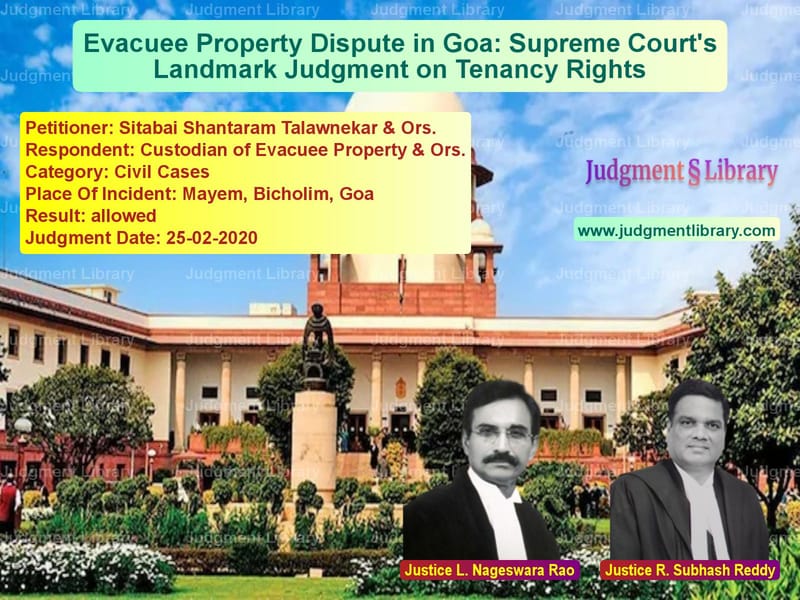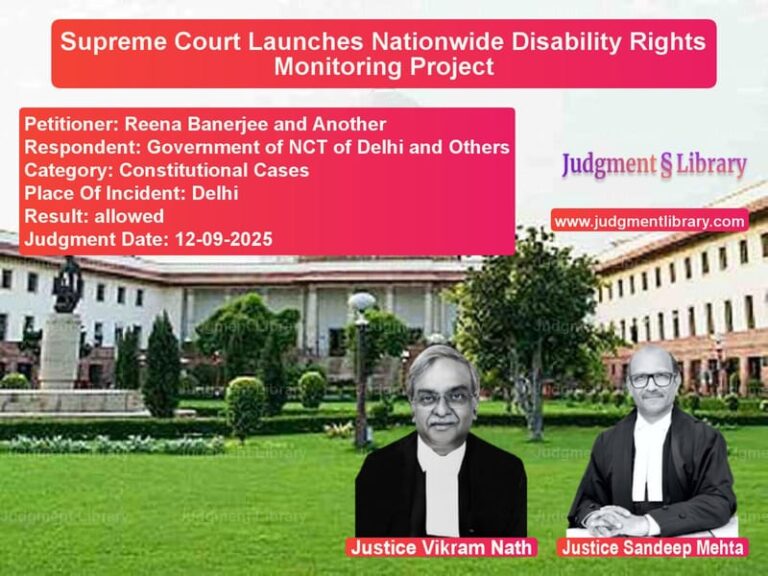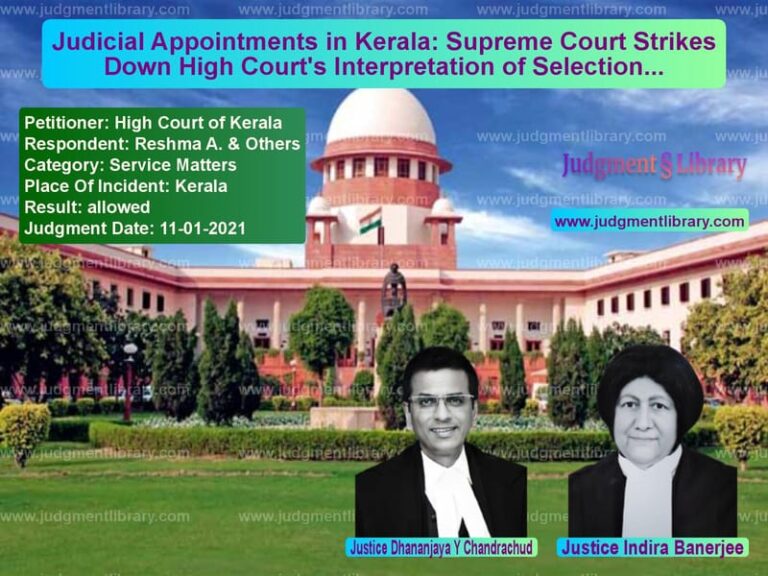Evacuee Property Dispute in Goa: Supreme Court’s Landmark Judgment on Tenancy Rights
The case of Sitabai Shantaram Talawnekar & Ors. v. Custodian of Evacuee Property & Ors. revolves around a prolonged legal dispute concerning the ownership and tenancy rights of a property known as ‘Conde-Mayem’ in the state of Goa. The litigation spanned multiple courts, raising significant legal questions about tenancy rights on evacuee properties under the Goa, Daman, and Diu Agricultural Tenancy Act, 1964, and its amendments. The Supreme Court’s final ruling in this case clarifies the legal standing of tenants on evacuee properties and the procedural requirements for tenancy recognition.
Background of the Case
The subject property, located in Mayem, Bicholim, Goa, was originally owned by Eurico de Soza Joquem Noroana. Following the liberation of Goa, the land was declared evacuee property and placed under the supervision of the Custodian of Evacuee Property under the Goa, Daman, and Diu Administration of Evacuee Property Act, 1964. The appellants claimed to be tenants of the Custodian, while the respondents argued that they had acquired tenancy rights over a portion of the property.
The dispute dates back to 1984 when the appellants’ predecessors filed a civil suit for permanent injunction against the respondents to prevent interference with the property. The suit resulted in an ex-parte injunction order in 1985. However, the legal battle continued with multiple suits, applications, and appeals over the following decades.
Legal Issues Involved
The case raised several key legal questions:
- Whether the respondents had a valid claim to tenancy rights under the Goa, Daman, and Diu Agricultural Tenancy Act, 1964.
- Whether the amendments made in 1989 to the Evacuee Property Act extended tenancy rights to the respondents.
- Whether the lower courts erred in granting tenancy rights to the respondents without sufficient documentary evidence.
- Whether tenancy claims over evacuee property required prior approval from the Custodian.
Petitioners’ Arguments
The appellants, represented by senior counsel, contended that the respondents’ claim for tenancy rights was invalid on multiple grounds:
- The lower courts failed to examine the relevant provisions of the Tenancy Act.
- The respondents did not provide documentary evidence proving their tenancy.
- Evacuee properties were governed by the Evacuee Property Act, and any transaction involving such property required prior approval from the Custodian, which was absent in this case.
- The respondents were not in possession of the land at the time of making their application for tenancy rights.
- The primary authority granted tenancy rights without recording valid reasons or considering legal requirements.
Respondents’ Arguments
The respondents, represented by their legal counsel, argued that their tenancy claim was valid based on the following points:
- The tenancy claim was backed by concurrent findings of all lower authorities.
- The respondents had been in possession of the land and had cultivated it for a considerable period.
- Both oral and documentary evidence supported their tenancy claim.
- The 1989 amendments to the Evacuee Property Act extended tenancy rights to evacuee properties, making their claim valid.
Supreme Court’s Analysis
The Supreme Court critically analyzed the evidence and legal provisions before reaching its verdict. The court made the following observations:
- The respondents failed to establish a legal relationship with the Custodian, which was a prerequisite for tenancy recognition.
- The 1989 amendments to the Evacuee Property Act applied only to tenancies explicitly created by the Custodian.
- No prior approval from the Custodian was obtained for any tenancy transfer, making the respondents’ claim legally untenable.
- The alleged oral settlement, which the respondents relied upon, could not serve as a valid basis for granting tenancy rights.
- The lower courts and authorities failed to properly analyze the evidence and legal provisions, leading to erroneous conclusions.
Final Judgment
The Supreme Court allowed the appeal and set aside the lower courts’ orders. The respondents’ application for tenancy rights was dismissed. The ruling reaffirmed that tenancy claims on evacuee properties must strictly comply with legal provisions, and mere long-term possession does not automatically confer tenancy rights.
Legal Implications of the Judgment
This judgment provides important legal clarity on several fronts:
- It reinforces that tenancy rights on evacuee properties must be derived directly from the Custodian.
- It highlights the importance of prior approval from the Custodian in property transactions involving evacuee land.
- It serves as a precedent for similar property disputes where tenancy claims are made without adequate documentary evidence.
- It emphasizes the necessity of a strict legal framework to protect evacuee properties from unauthorized claims.
Overall, the ruling ensures that evacuee properties are managed according to established legal principles and prevents unauthorized claims from being validated without proper legal backing.
Petitioner Name: Sitabai Shantaram Talawnekar & Ors..Respondent Name: Custodian of Evacuee Property & Ors..Judgment By: Justice L. Nageswara Rao, Justice R. Subhash Reddy.Place Of Incident: Mayem, Bicholim, Goa.Judgment Date: 25-02-2020.
Don’t miss out on the full details! Download the complete judgment in PDF format below and gain valuable insights instantly!
Download Judgment: Sitabai Shantaram Ta vs Custodian of Evacuee Supreme Court of India Judgment Dated 25-02-2020.pdf
Direct Downlaod Judgment: Direct downlaod this Judgment
See all petitions in Property Disputes
See all petitions in Specific Performance
See all petitions in Judgment by L. Nageswara Rao
See all petitions in Judgment by R. Subhash Reddy
See all petitions in allowed
See all petitions in supreme court of India judgments February 2020
See all petitions in 2020 judgments
See all posts in Civil Cases Category
See all allowed petitions in Civil Cases Category
See all Dismissed petitions in Civil Cases Category
See all partially allowed petitions in Civil Cases Category







